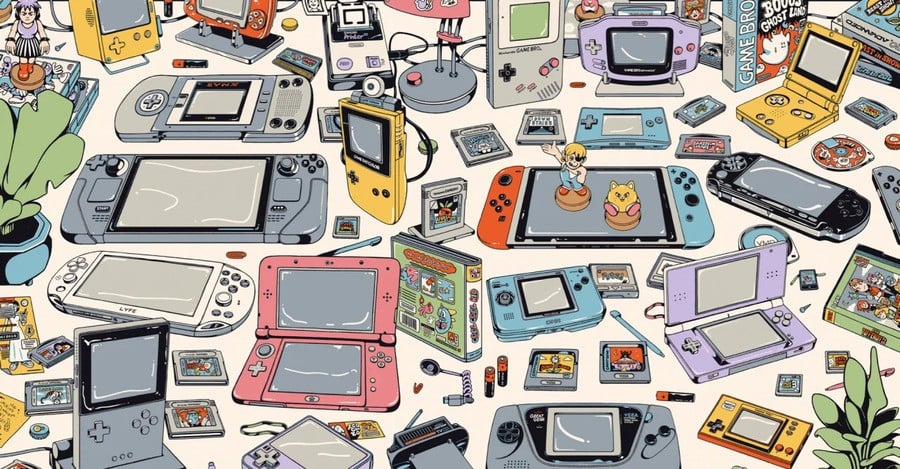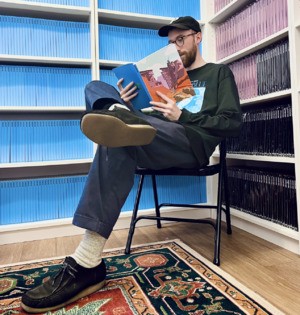
It's no secret that the internet has changed video game journalism forever. Once, your local newsagent would have shelves of magazines devoted to the latest games and gaming platforms, but now, that section has shrunk to almost nothing as the majority of gaming media has shifted online. Keeping this in mind, the notion of creating a company which is solely focused on gaming print media might seem foolish, but UK publisher Lost in Cult has done just that – and it has enjoyed considerable success in the process.
Lost in Cult publishes [lock-on], which is described as "a premium gaming journal delivering thought-provoking stories, insightful features and carefully curated art from industry talent." Issue 4 is currently in production, and the series has used crowdfunding to reach its audience thus far.
To mark the arrival of Lost in Cult's latest venture, A Handheld History, we sat down with founder Jon Doyle for a quick chat.

Time Extension: What inspired you to launch Lost in Cult publishing and create physical magazines?
Jon Doyle: The initial concept of Lost In Cult began in late 2016, and I was originally intending to launch a record label for video game and movie soundtracks, and be a distribution point in the UK post Brexit. Around this time I was going through some pretty bad anxiety, and I was looking for ways to be more creative. I started doing freelance design for video game publishers. My background before this was visual marketing for the fashion industry and working within the video game market as a physical media sales manager for distributors. I really enjoyed returning to the video game market after a hiatus, and before long I was designing for Iam8bit amongst others. Around this time I started helping with the initial imagery for Ninty Media projects like Switch Player and Ninty Fresh. I was tasked with coming up with the visual marketing and covers for each issue. I have always been a huge fan of premium books and journals, and at this stage I decided to start revisiting Lost In Cult but from a print media perspective. I felt the book market was becoming saturated with lower quality material.
In 2019 one of my closest friends passed away. I spent a lot of time with him in the last weeks of his life, and his advice to me was pretty stark — I was wasting my life through the fear of failure. Then the pandemic happened, and along with dealing with the death of my friend and his advice still ringing in my ears, It gave me a lot of time to really think about my life and what I wanted. For the first time in a decade, my anxiety started to alleviate rapidly. I took what I had learnt from visual marketing in the streetwear market and my love of video games and movies, and constructed [lock-on].
In 2019 one of my closest friends passed away. I spent a lot of time with him in the last weeks of his life, and his advice to me was pretty stark — I was wasting my life through the fear of failure
What are the biggest challenges when it comes to putting together a publication like this?
It's that timeless thing of every issue that arises is likely something you never considered, creating a high-cost project during a global downturn and in the middle of a pandemic seemed ludicrous. I sought initial funding from a few circles and was declined from all of them. Print media was "dead" and my projections "outlandish".
But I had spent decades studying sales patterns and markets within enthusiast groups. Hell, I'm an enthusiast myself! I spend my money on premium, tangible items that expand the culture of my interests, and during the pandemic, we saw others spending their money for the same reason — the need for premium products and physical media in general grew rapidly, especially in the book and music segments. Sectors previously dramatically oversaturated by digital media saw large portions of customers turn to tangibility and quality. Obviously keeping our projects to this high standard has meant we create all aspects in-house and manufacture entirely within the UK, which has led to ongoing issues with global paper shortages and the ever-rising cost of shipping.
What do you find the most rewarding aspect of creating these magazines?
I wouldn't be lying if I told you video games saved my life. Like so many people the community, lore and cultural significance of gaming has profoundly shaped my entire self. I grew up importing PC Engine games secretly without my parent's knowledge, my favourite games being Japanese imports of titles like Splatterhouse on the FM Towns Marty or Zenki FX on the PC-FX. My friends were obsessed with FIFA and the typical AAA fare at the time, so I had the feeling I was in a very different place.
To now be able to make products that allow me to pay tribute to the likes of Clock Tower, Deep Fear and Pepsi Mano, and have an entirely new audience see them, is extremely rewarding. A developer told me that we spent more time and effort on the artwork for his story in [lock-on] than his publisher ever did. Video games to me are cultural cornerstones that demand preservation and to be treated like art. I hope we can help share this ethos.
How many people are involved with a typical issue of [lock-on], and could you talk us through the process of creating an issue from start to finish?
With Volume 001 we had around 5-6 key staff and 30 contributors involved. All of us did this as an entirely part-time side project in our spare time. Now, with Volume 004, we have over 100 staff and contributors working together, and we have expanded from 150 pages to 200+ for every issue. We doubled the amount of artwork and written content too. Given the small scale of these projects and lack of any real advertising or sponsorship, we have tried to increase the rate of pay for writers to be very competitive whilst also letting them talk about what inspires them and not what SEO demands.
We have tried to increase the rate of pay for writers to be very competitive whilst also letting them talk about what inspires them and not what SEO demands
The current process per issue involves the initial curation of the volume, looking to fill a planner with the written side, then seeking artists to help achieve this vision. We assemble a large portion of the content and then run the campaign with the help and love of the community, our contributors and also developers, to help us reach new eyes. Never have I felt such a level of purpose and cohesion in anything I have ever worked on. it's truly incredible
You've chosen to use crowdfunding to pay for the production of each issue. What benefits does this approach deliver?
It's crucial to have a central locale to send people to and Kickstarter made sense when we launched our first volume. It became clear very quickly that it wasn't quite as simple as I'd imagined, and we struggled to fund. Only when Volume 001 was finished and shipped did it take on a life of its own and sell out almost immediately. People were able to see what we had created, and it just clicked.
We now use Kickstarter as a central hub to bring people together rather than as a crucial aspect to fund an issue, as it allows us to coordinate announcements, updates and rewards into one central location where backers get instantly notified of developments. This led us to set up "Lost In Cult Presents", our very own crowdfunding platform run via our own site. This benefits from the lack of high Kickstarter fees and has allowed us to become a hub for artistically and design-driven productions, aimed at an audience who really cares about them. A Handheld History, our debut "Lost In Cult Presents" project, outsold every issue of [lock-on] during its funding period, and it did so without the extra platform fees. This is better for us and the people we partner with on these books, like Retro Dodo.
What's the reaction been like from readers, developers and the industry in general?
What's been incredible for me is something I really did not expect — the demographic breakdown. Typically video game physical media has had a very high 30+ adult male lean, but with [lock-on] we have seen people as young as 16-18 buying the journal and a much higher non-male audience than you would traditionally expect. It's great that we are creating something that is truly resonating with so many people. Gaming is for everyone after all, and it's nice to see younger games interested in long-form discussion about the medium. I recently had a 50-minute conversation with two 18-year-old gamers in Devil May Cry cosplay at an industry event — they knew who we were immediately and we ended up discussing the undertones of Silent Hill 2. It's something else to experience.
With Volume 001 nobody was interested in working with us, and now we are struggling to have space for everyone interested in being involved
The industry feedback has also been very interesting. Initially, with Volume 001 nobody was interested in working with us, and now we are struggling to have space for everyone interested in being involved. It's amazing to now be at the stage where I can speak with people I have idolised on a daily basis.
You're also branching out into books with your new handheld project - what was the motivation behind that and can we expect more of the same?
This was always the plan, to become a hub for video game art and culture print — to allow writers and artists a space away from the less invested outlets. We have multiple projects signed, including official 'making of' and art books for beloved games. Some will be published by us and others we will be designing in collaboration with others — I can't wait to show people what we have cooking this year and next. Needless to say, we are always looking for new projects to take on and grow this amazing team even further.
In the age of the internet, where content is daily and free, what extra value does the printed word deliver?
In the age of rapid media consumption, sometimes it's nice to just take a seat and slow down for a while.
We'd like to thank Jon for his time. You can order copies of [lock-on] and A Handheld History direct from Lost in Cult's site.







Comments 0
Wow, no comments yet... why not be the first?
Leave A Comment
Hold on there, you need to login to post a comment...